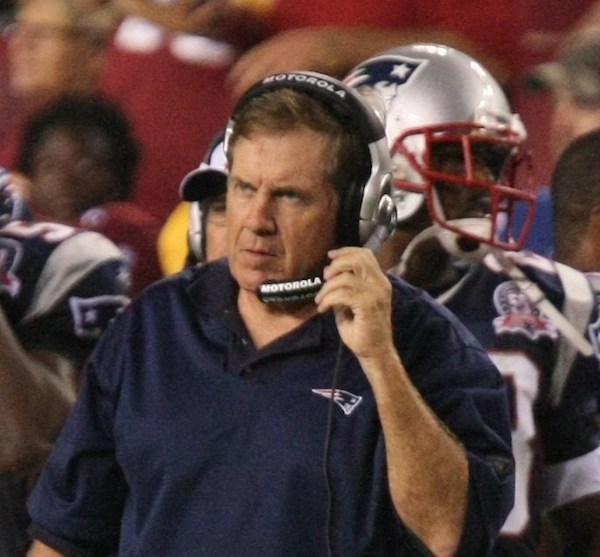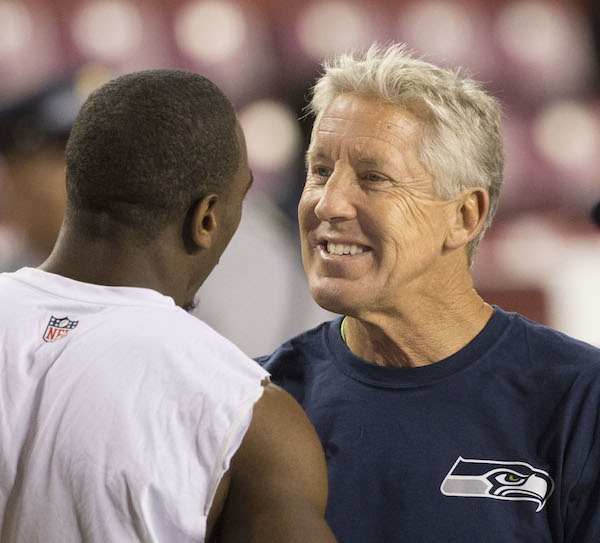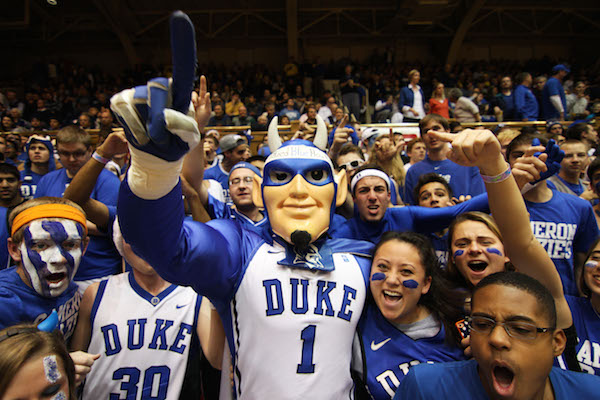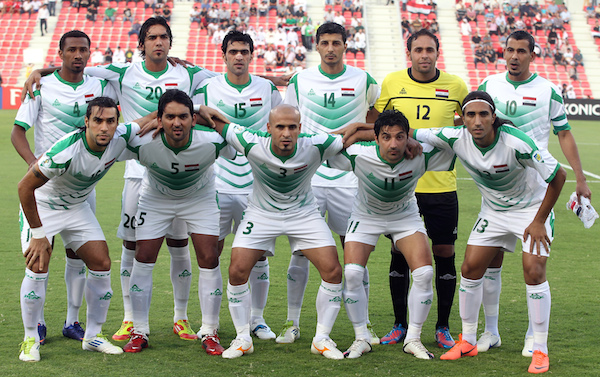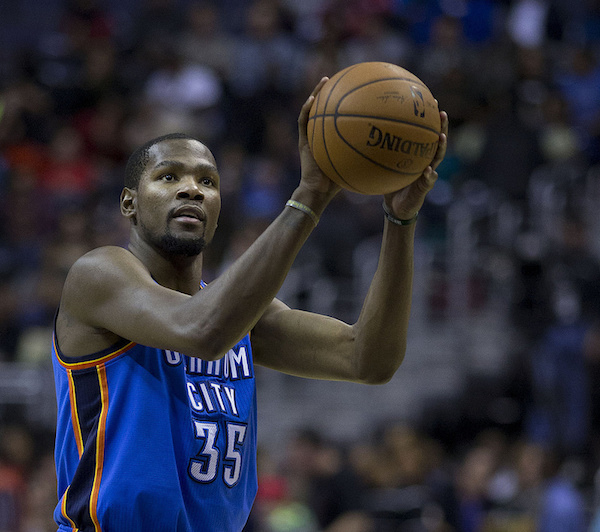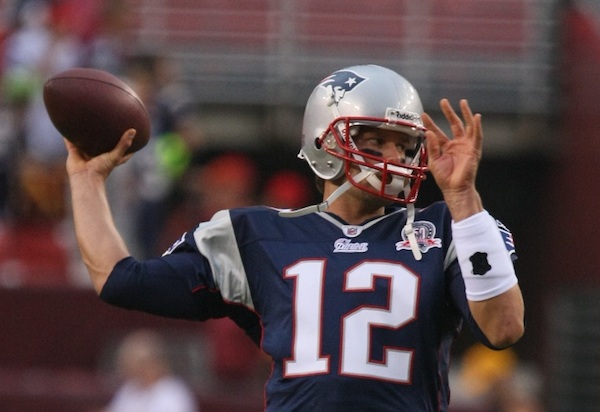In this morning’s post about Pete Carroll, the Seattle Seahawks head coach, I described Carroll as “an oil salesman” and wrote that it was “up to you whether you believe he’s selling snake oil or the best crude out there.” The subject of this post, is the head coach of the New England Patriots, and Carroll’s key opponent in the upcoming Super Bowl. Bill Belichick would be the world’s worst salesman, of oil or anything else. He is a complex, intriguing man whose brilliant talent for football is only matched by his apparent contempt for everything he feels is non-essential to winning football games. Whether you think he is simply a porcupine without the desire or talent to cloak himself in the skin of a cuddlier animal or you think he is a teddy-bear wearing chain-mail probably has a lot to do with whether you root for the New England Patriots and vis-versa. Bill Belichick is the single most powerful man in the New England Patriots organization. Trying to enjoy the Super Bowl without learning a bit about Belichick would be like watching the game on a standard-def, black and white TV.
What is Bill Belichick’s background?
In perhaps the least surprising biographical detail ever, Bill Belichick is the son of a football coach and military man. Bill Belichick was raised in Annapolis Maryland while his father served as assistant coach of the Navy football team. He played football as a young man but it was clear early on (and probably to Belichick as much as to his coaches) that his future would be as a coach, not a player. He went to college at Wesleyan College in Connecticut, a school known more for its music department than its football team. Belichick played as a Center and Tight End but was perhaps more known as a guy-around-campus than an athlete. A college teammate of Belichick’s described his role as president of Wesleyan’s Chi Psi fraternity, a notorious group of drunken pranksters by saying ‘‘It wasn’t that Bill didn’t like to have fun and party,’’ Farrell said. ‘‘He just wasn’t going to be the stupid one.’’ Hold on to that thought. If the NFL today resembles a frat party, Belichick still plays that role to a T.
After college, Belichick went right into NFL coaching, taking minor jobs with the Colts, Lions, and Broncos. Then in 1979, Belichick was hired by the New York Giants and his career took off. The Giants at that time were led by a legendary head coach named Bill Parcells, who was perhaps the opposite of Belichick in terms of outward presentation. Nonetheless, he saw something in Belichick, and by 1985, had promoted him to defensive coordinator. In 1991, Belichick was hired as head coach of the Cleveland Browns. This did not work out well. He spent five years with the Browns during which the team only had a winning record and made the playoffs in one year. Belichick angered fans of the team so severely when he cut quarterback Bernie Kosar from the team, that by the end of his time in Cleveland he was receiving FBI protection. In early 1996, in the midst of moving the team to Baltimore, where they were to become the Ravens, Belichick was fired.
As devastating as that failure must have been, it didn’t take long for Belichick to get swooped up by another team. His old mentor, Bill Parcells, at that time head coach of the New England Patriots, hired Belichick back on as an assistant head coach. The team thrived under their leadership and went to the Super Bowl in 1996. Despite their success, Parcells left shortly afterwards because of a dispute with team owner, Robert Kraft. Parcells felt he should be given authority as a general manager to make decisions about what players to draft or acquire through free agency or trades. Kraft disagreed.
After two hard-to-explain stints as the head coach of the New York Jets, neither of which lasted for longer than a day, Belichick was hired as the head coach and general manager of the New England Patriots in 2000. Almost immediately, the Patriots took off an a streak of winning unprecedented in modern NFL history. In his second year as head coach, the Patriots went 11-5 and won the Super Bowl. In his fourth and fifth years, the Patriots went 14-2 and won the Super Bowl both times. Three Super Bowl wins in four years made Belichick a success. Since then, he has kept the team running at an amazing clip, winning more than 10 games every year and making the playoffs every year except for one. How does he do it? What is his secret?
What’s he all about?
The writer David Halberstam described Bill Belichick as “the ultimate rational man.” Charlie Pierce described him as “the last NFL anarchist, the Lord of Misrule.” It’s very possible that they are both right. I think Belichick is one of the most carefully divided people around. He seems to be able to completely separate his personal life and his professional life; his emotions from his logic. Here’s what is undeniably true about Belichick.
- He tries to be smarter than everyone else and often is. For years, Belichick has been “trading down” in the NFL draft. This means he trades the right to choose players earlier for the chance to select more players. He knows that accurately predicting player performance is a fool’s game and refuses to play it.
- He has frequently cut or traded players, even well-respected veteran leaders, from his team before any decline in their performance was apparent to teammates, fans, and analysts.
- He is unconventional in many ways. I wrote a whole post about this the other day. Belichick is a free-thinker in a league of copycats. He plays offensive players on defense sometimes, he will not hesitate to run the ball 50 times in a row if it is working or throw 60 times in a row. He feels no need to do what everyone else is doing. More than any other coach, he seems to plan his team’s tactics each week based on what his opponent’s strengths and weaknesses are.
- He has been punished by the NFL once for cheating, in 2007 when the Patriots were caught filming opponent’s practice sessions, and is currently embroiled in a controversy over whether the Patriots illegally deflated footballs during their game against the Colts.
- He seems to distain either the media or the expectations of an NFL coach to be a public figure. He says as little as possible in press conferences and seems to be annoyed most of the time. He wears informal clothing, verging on the sloppy, most of the time, including a cut-off, hooded sweatshirt look that he has become famous for.
Bill Belichick is an uncomfortable reminder of the underlying truths of professional football. Winning is everything, players are commodities, and the narratives surrounding the game are not directly connected to the people who work within the sport, no matter how much we like to think they are. For as lucrative a business as the NFL is, it’s owners, coaches, and GMs are often sloppy and inefficient in the way they think. They fall into following conventions far too often. Belichick is the guy who points out that the emperor is naked, that the company’s revenues will never match its losses, and that you are not seeing things clearly. Coaches matter more in football than in any other sport, so it’s no surprise that Belichick has been so successful. He seems to be the best coach in the NFL.
What will it mean if he wins? What will it mean if he loses?
Unfortunately, the Belichick narrative right now is caught up in #DEFLATEGATE and #BALLGHAZI. If Belichick wins, it will confirm the age-old wisdom, “if you’re not cheating, you’re not trying.” If the Patriots lose, people will see this as them getting their just desserts for having cheated.
With time, the furor over the footballs will die down. Later, a win will be seen as an unneeded but much appreciated confirmation of Belichick’s era as head coach of the New England Patriots. If they die, the Patriots dynasty will be remembered more as “three-super bowl wins in four years” than fifteen years of sustained excellence.
Prepare for the Super Bowl with Dear Sports Fan. We will be running special features all week to help everyone from the die-hard football fan to the most casual observer enjoy the game. If you haven’t signed up for our newsletter or either of our Football 101 or 201 courses, do it today!

